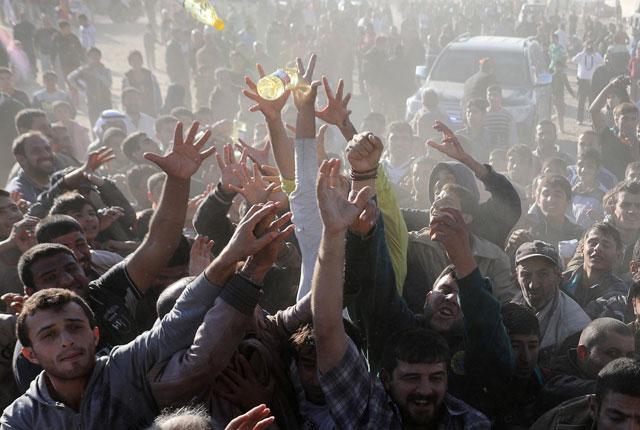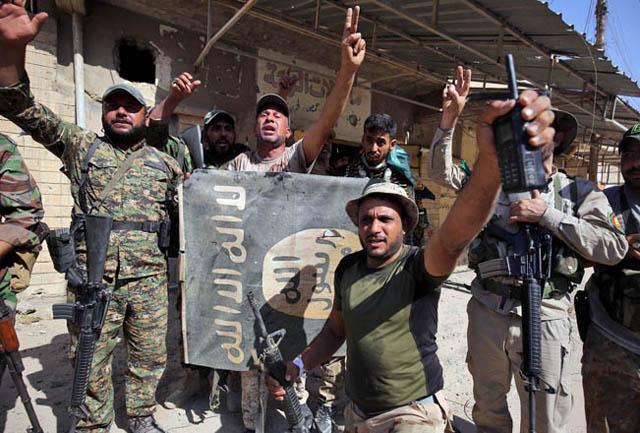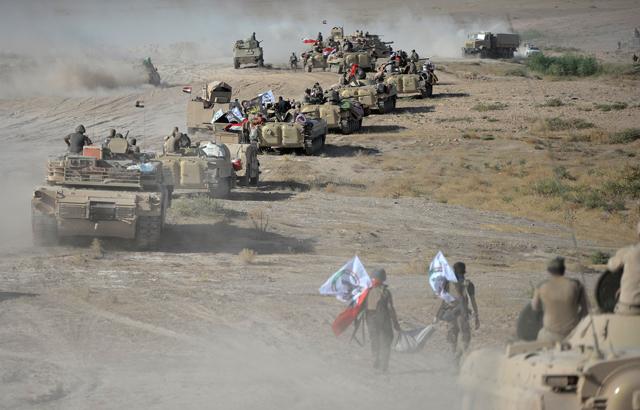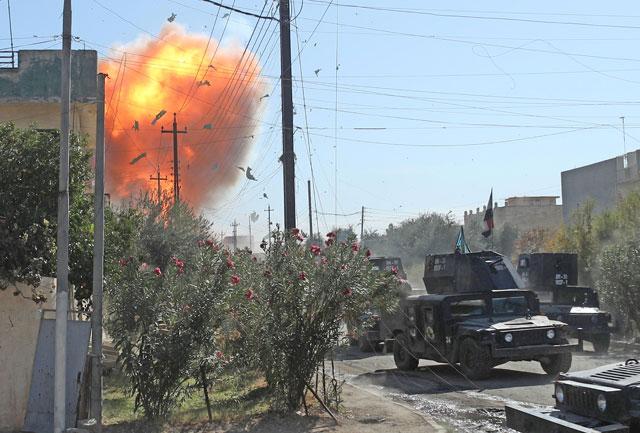You are here
Iraqi forces dig in as Mosul battle rages
By AP - Nov 20,2016 - Last updated at Nov 20,2016

People wait for food donated by an Iraqi government organisation on the outskirts of Mosul, Iraq, on Sunday (Reuters photo)
MOSUL — Iraqi troops on Sunday fortified their positions in Mosul neighbourhoods retaken from the Daesh terror group as their advance towards the city centre was slowed by sniper fire and suicide bombings, as well as concern over the safety of civilians.
"The biggest hindrance to us is the civilians, whose presence is slowing us down," Maj. Gen. Sami Al Aridi of the special forces told The Associated Press. "We are soldiers who are not trained to carry out humanitarian tasks."
A few hundred civilians emerged from rubble-strewn front-line neighbourhoods on Sunday. They included women and children, some of them carrying bags, small suitcases or waving white flags. Mosul is still home to more than 1 million people.
The government sent half-dozen trucks loaded with food aid into the recently liberated areas. Chaos broke out in one neighbourhood, where residents climbed on top of the trucks and began helping themselves
"It's hunger that makes people behave like this," said Mohammed Farouq, a 27-year-old resident. "Some families took many boxes, while others did not take any. This is unfair."
Aridi said his men were searching homes in areas retaken from Daesh, looking for militants and vehicles rigged with explosives. Troops in those areas continue to be hit by mortar rounds, sniper fire and suicide bombers, he said.
In the newly liberated areas, roads are blocked by car wrecks and sandbags, and tanks are deployed on wider streets. Snipers on high buildings watch for suicide bombers or other intruders. Brig. Gen. Haider Fadhil said four civilians were killed and another four wounded when a suicide car bomb exploded before it could reach the troops it was targeting late Saturday.
The troops laid siege Sunday to Al Zohour neighbourhood, about eight kilometres from the city centre. The arrival of the troops at the neighbourhood's fringes prompted hundreds of civilians to emerge from their homes waving white flags. The special forces later drove Daesh from two other neighbourhoods.
The Iraqi military launched a campaign on October 17 to retake Mosul, Iraq’s second largest city and the extremist group’s last major urban bastion in the country. Most gains have been made by the special forces operating in the section of Mosul east of the Tigris River. Other forces are advancing on the city from different directions, and the US-led coalition is providing air strikes and other support.
Daesh captured Mosul in the summer of 2014 as part of a blitz that placed nearly a third of Iraq under their control. Iraqi troops, federal police and allied Shiite and Sunni militias have over the past year pushed Daesh militants from most of the vast Sunni province of Anbar, west of Baghdad, and areas to the north and east of the Iraqi capital.
Army troops arrived on the outskirts of Tal Afar, west of Mosul, to reinforce state-sanctioned Shiite militias, who have captured the town’s airport and are preparing to retake the town, according to two senior militia officials. They spoke on condition of anonymity because they were not authorised to brief the media.
Prior to its capture by Daesh, Shiites constituted the majority of Tal Afar’s estimated 200,000 residents.
Human Rights Watch said in a report Sunday that Sunni militiamen fighting alongside the Iraqi military detained and beat 22 men from villages near Mosul and recruited 10 children from displaced camps in the area to join the fight against Daesh.
“The Iraqi authorities should investigate any alleged acts of torture and cruel and inhuman treatment in custody and charge those responsible for war crimes, including anyone with command responsibility who should have known about the crimes and failed to take all reasonable measures to prevent them,” said the New York-based advocacy group.
“The US should press the Iraqi government to ensure that the troops they are supporting don’t have fighters under 18 in their ranks,” said Lama Fakih, HRW’s deputy Middle East director.
In Baghdad, four separate bomb attacks targeted commercial areas on Sunday, killing at least 10 civilians and wounding 34, according to police and health officials, who spoke on condition of anonymity because they were not authorised to brief the media.
Baghdad has for more than a decade been the scene of near daily bomb attacks blamed on Daesh and other militants. There was no immediate claim of responsibility for any of Sunday’s attacks.
Related Articles
TAL AFAR, Iraq —Iraqi forces announced Saturday the ouster of the Daesh terrorist group militants from central Tal Afar and its historic cit
TAL AFAR, Iraq — Iraqi forces Wednesday recaptured several districts and advanced towards the centre of Tal Afar, one of the Daesh terror gr
MOSUL, Iraq — Iraqi troops faced stiff resistance on Saturday from Daesh militants as they pushed deeper into eastern Mosul, backed by aeria

















